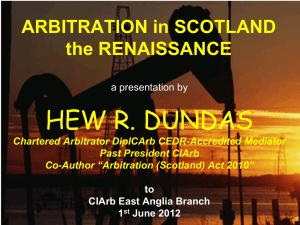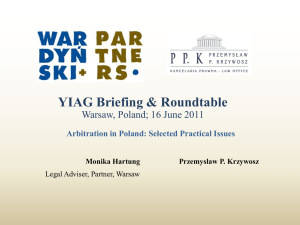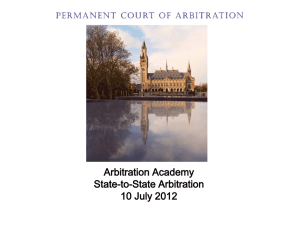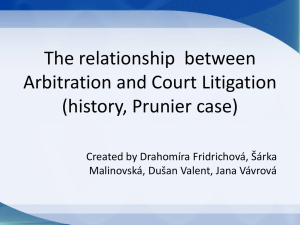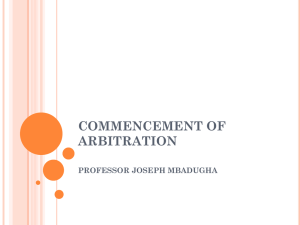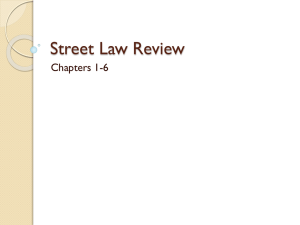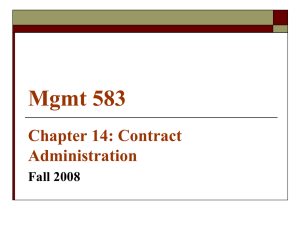tomlinson associates - The Chartered Institute of Arbitrators, East
advertisement
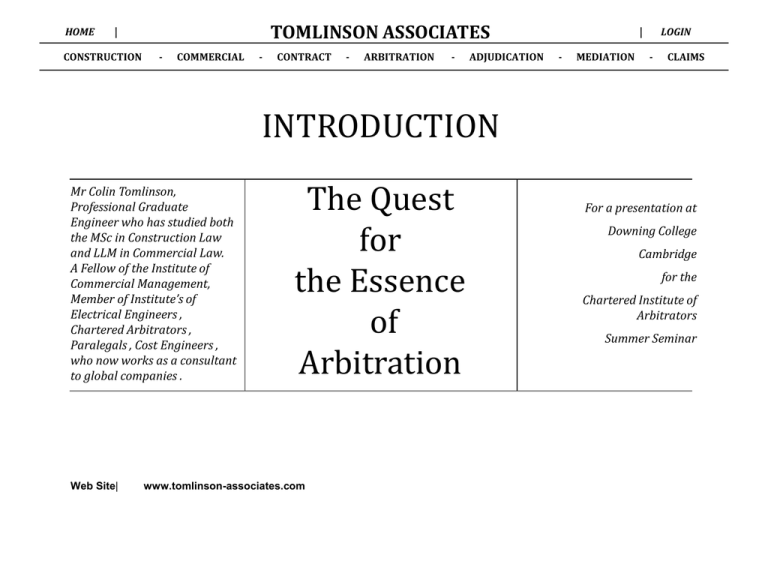
HOME TOMLINSON ASSOCIATES | CONSTRUCTION - COMMERCIAL - CONTRACT - ARBITRATION - ADJUDICATION LOGIN | - MEDIATION - CLAIMS INTRODUCTION Mr Colin Tomlinson, Professional Graduate Engineer who has studied both the MSc in Construction Law and LLM in Commercial Law. A Fellow of the Institute of Commercial Management, Member of Institute’s of Electrical Engineers , Chartered Arbitrators , Paralegals , Cost Engineers , who now works as a consultant to global companies . Web Site| The Quest for the Essence of Arbitration www.tomlinson-associates.com For a presentation at Downing College Cambridge for the Chartered Institute of Arbitrators Summer Seminar HOME TOMLINSON ASSOCIATES | CONSTRUCTION - COMMERCIAL - CONTRACT - ARBITRATION - LOGIN | ADJUDICATION - MEDIATION - CLAIMS THE ESSENCE OF ARBITRATION ? What is Arbitration Arbitration, a form of alternative dispute resolution (ADR), is a legal technique for the resolution of disputes outside the courts, where the parties to a dispute refer it to one or more persons (the "arbitrators", "arbiters" or "arbitral tribunal"), by whose decision (the "award") they agree to be bound Wikipedia What is the purpose of Arbitration? To resolve disputes But how is it to perform that function Arbitration is generally used when all parties agree to the process. Most commonly, it is used because there is an arbitration clause in a commercial or consumer contract. Arbitration is a formal process in which an impartial third party with specialist background knowledge on the nature of your dispute hears all parties and makes a binding decision to resolve it. Law Society Breaking News | Around 440 BC, Leucippus of Miletus and his pupil, Democritus originated the atom concept HOME TOMLINSON ASSOCIATES | CONSTRUCTION - COMMERCIAL - CONTRACT - ARBITRATION - LOGIN | ADJUDICATION - MEDIATION - CLAIMS IN THE BEGINNING Plato writing around 350BC describes for want of a better word the “essence” of Arbitration in the failure to fulfil a contract : If a man fails to fulfil an agreed contract … an action should be brought in the tribal courts if the parties have not previously been able to reconcile their differences before arbitrators (their neighbours that is).” Plato, The Laws, Translated by Saunders, Penguin books In The Law Plato gives an example of the type of dispute that would be Arbitrated around 350BC “But if any professional person sell any such slave … (with some defect) … which most men would fail to notice, to a layperson, the buyer may claim restitution. (The) … action shall be tried before a bench of doctors nominated and chosen by the parties.” …In this case Doctors were chosen because of their particular skill to examine a slave but appointment was only by the agreement of the parties. Aristotle explains that the law in use is the Law of Equity, “It bids us remember ... to settle a dispute by negotiation and not by force; to prefer arbitration to litigation -- for an arbitrator goes by the equity of a case, a judge by the strict law, and arbitration was invented with the express purpose of securing full power for equity."” Aristotle Rhetoric 4th century BC HOME TOMLINSON ASSOCIATES | CONSTRUCTION - COMMERCIAL - CONTRACT - ARBITRATION - LOGIN | ADJUDICATION - MEDIATION - CLAIMS EQUITY Cicero wrote "Nore would our ancestors permit to be a Judex even in the most trifling money matters, not to speak of offers concerning the dignity of a man, unless the offering parties were agreed upon him." I.e. to appoint a person that the parties agree upon, again it can be seen that the system worked on a version of the Law of Equity rather than State Law. Aristotle considered the nature of equity and its relationship to justice in his famous passage from his work, Ethics. He concludes that equity’s role is to prevent the law from adhering too rigidly to its own rules and principles when those rules and principles would produce a miscarriage or injustice. Equity permits Arbitrators to depart from the legal principles to promote justice or that was the original concept if Aristotle is to be believed The Romans started their invasion of Britain from around 55 BC and with it came two types of law, the first was the Codified Law and secondly was Arbitration, the ability of the parties to Arbitrate disputes in proceedings agreed between the parties. Breaking News | 54 BC – Mrs Caesars little boy Julius decided on a three month holiday to Briton HOME TOMLINSON ASSOCIATES | CONSTRUCTION - COMMERCIAL - CONTRACT - ARBITRATION - LOGIN | ADJUDICATION - MEDIATION - CLAIMS DEVELOPMENT OF THE LAW Through the thirteenth and fourteenth centuries the English Courts started to developed the Common Law and the system of assumpsit. Pleading a case became very intricate with only certain avenues of address were open to the claimant. Breaking News | The 100 Years' War was actually a series of conflicts between France and England that began in 1337 and ended in 1453 Aggrieved persons found that legitimate complaints were rejected for failure to comply with the technicalities of the requirements for the submission of the pleadings and if the complaint was not dismissed at first instance, relief was in most case denied based on the lack of a controlling statute or precedent. HOME TOMLINSON ASSOCIATES | CONSTRUCTION - COMMERCIAL - CONTRACT - ARBITRATION - LOGIN | ADJUDICATION - MEDIATION - CLAIMS DIFFERENT SYSTEMS The aggrieved plaintiffs therefore then looked to the king whom in turn referred requests for relief to the Chancery Court (defined as a “court with jurisdiction in equity”). The Chancery possessed the power to settle disputes according to their conscience with little or no regard to the Common Law hence the basis for the Law of Equity. The Common Law and Law of Equity represented two opposing values in the English Legal System. The Common Law was created independently from the Crown, whereas the Chancery and its use of the Law of Equity developed as part of the duties firstly imposed by Edward I of England due to his annoyance at the number of cases coming to him The Chancery was seen as one of the four central courts and the number of private cases had increased dramatically. The reason for this was the only remedy available to the Common Law Courts was the award of damages, but the Chancery had the ability to make an order of specific performance or an injunction. Breaking News | The 4 different Courts were at odds with each other, Ecclesiastical, Chancery , Common, Jus HOME TOMLINSON ASSOCIATES | CONSTRUCTION - COMMERCIAL - CONTRACT - ARBITRATION - LOGIN | ADJUDICATION - MEDIATION - CLAIMS ISSUES BEFORE THE ACT Had the parties entered in to a valid agreement to Arbitrate and if so agreed to be bound by the award? WROTTING v ALGOR (1405) Coram Rege Roll 575 There are several reported cases where a losing party refused to acknowledge that an arbitration took place. ASSER v BRADMOR (1405) Coram Rege Roll 575 BLOUNDELL v AKELEY (1471) YB 10 Edw IV One of the problems was that any party could revoke the Arbitrators authority before the published award An alternative to the losing party was an attempt to upset the award. Claims that the award had not been published, or that it was incomplete may be found FANE v PRIOR OF TONBRIDGE (1522) CP Apr ANON (1522 or 1523) One way round this was the introduction of the Arbitration Bond which meant that if the loser did not honour the award the other party would call for the bond, and example is SCOTT v BERACRE (1313) YB 6 & 7 Edw II where an award of £15 was not honoured. ‘ S’ sued on a bond of £30 which the parties had entered into to give effect to the award. Breaking News | Mrs Shakespeare's little boy William wrote a few plays (1564 - 1616) HOME TOMLINSON ASSOCIATES | CONSTRUCTION - COMMERCIAL - CONTRACT - ARBITRATION - LOGIN | ADJUDICATION - MEDIATION - CLAIMS TYPICAL 15TH CENTURY EXAMPLES in Wrotting v Algor (1405) the sheriff was directed to secure a jury at Westminster to enquire whether the parties had agreed to Arbitrate and if so had the parties agreed to be bound by the award of the Arbitrator In 1484 rivalry between the two guilds erupted into violence during the Mayor of London’s river procession, both guilds were in the habit of racing each other and on this day the race got out of hand with the result of injury and death. The parties agreed to Arbitration and the Arbitrator’s decision (Robert Billesdon) resolved the issue by deciding that the Barges should alternate between sixth and seventh place each year, an equitable decision and giving rise to the saying “all at sixes and sevens. Breaking News | The Houses of York and Lancashire fight The War of the Roses 1455 - 1485 In Bloundell v Akeley (1471) a similar direction was given so the jury could enquire into the validity of an obligation under seal to refer to arbitration and whether an award had actually been published HOME TOMLINSON ASSOCIATES | CONSTRUCTION - COMMERCIAL - CONTRACT - ARBITRATION - LOGIN | ADJUDICATION - MEDIATION - CLAIMS 17TH CENTURY THREE WAY OF DEALING The first was an arbitration commenced at Common Law without the Court's involvement. This was the traditional method of Arbitration whereby the parties agreed on an Arbitrator who then proceeded to determine the issues privately between the parties without recourse to the Court. Whilst the procedure was a judicial process in that, in very limited and ill defined circumstances, the parties could invoke the aid of the Court by way of a Bill in Equity, it was not subject to systematic Court regulation or assistance. The second form of Arbitration was a reference by the Court in a pending suit. Since medieval times the Court had recognised that Arbitration had a role to play in the resolution of disputes. This procedure had the advantages of, on the one hand, enabling the parties to select the tribunal best qualified to decide the dispute, or part of it, while nevertheless retaining the sanction of the Court for a party's refusal to proceed with the arbitration. The third method comprised reference to Arbitration pursuant to statute. The success of referrals to Arbitration in a pending action culminated in an Act of 1698 which enabled parties to make the reference a rule of Court. That is, the parties could effectively register their Arbitration agreement with the Court; and their agreement thereby became subject to a similar sanction for non-observance as obtained in suits commenced in Court and subsequently referred to Arbitration The acts main objective of the act was to render an award more effective, and this can be seen in the Act 1698: “whereas it hath been found by experience, that reference made by rule of court have contributed much to the ease of the subject, in determining of Controversies, because the parties become thereby obliged to submit to the award of the arbitrator, under the penalty of imprisonment for their contempt in case they refuse Submission Breaking News | Change is afoot with the introduction of the Arbitration Act 1698 HOME TOMLINSON ASSOCIATES | CONSTRUCTION - COMMERCIAL - CONTRACT - ARBITRATION - LOGIN | ADJUDICATION - MEDIATION - CLAIMS JUDICIAL INTERFERENCE In 1802, English Courts claimed the right to interfere with an Arbitration Award for error of law on the face of the award; up to that point, the decisions of Arbitrators on questions of law had been conclusive, barring fraud or a similar allegation The wide degree of judicial oversight was unpopular with Arbitrators and led to the practice of Arbitrators detailing their reasons for the award, hoping to avoid judicial review; however, the reasons were stated in a separate, confidential document which prevented them from being shared with a court for the purpose of a substantive appeal Breaking News | The first real attack come in 1802 The second basis for judicial review of errors of law was in the form of a special case procedure, which empowered Arbitrators to state a case on a point of law for the Court’s opinion. While grounded in Common Law, the special case procedure was given limited recognition in the 1854 Act and subsequently codified in the Arbitration Act of 1950 HOME TOMLINSON ASSOCIATES | CONSTRUCTION - COMMERCIAL - CONTRACT - ARBITRATION - LOGIN | ADJUDICATION - MEDIATION - CLAIMS NEXT 200 YEARS In 1854 Common Law Procedures Act incorporated into statute a Common Law remedy that had been available for some time. Before the 1854 Act the Arbitrator was able to ask the Court’s opinion on a point of law as a Common Law right, the 1854 Act empowered the Arbitrator to state a case on a point of law for the Court’s opinion and held the Arbitrator duty bound to issues a valid award. The 1889 Arbitration Act repealed all previous legislation in Arbitration and reintroduced additional provisions encapsulated into the 1889 Arbitration Act as all encompassing, for the first time making provisions for the appointment of Arbitrators by Courts, setting out the terms and conditions to be universally implied into every arbitration agreement The Arbitration Act 1950 repealed all previous statue. An important development was the codification of the special procedures rule at section 21, providing that, following a party’s request, an Arbitrator could state an award (or part thereof) in the form of a special case for the consideration of the High Court; if the Arbitrator refused the High Court could order him to do so the Courts upheld the right to state a special case. “Arbitrators, unless expressly authorised, have to apply the laws of England. When they are persons untrained in law, and especially when as in this case they allow persons trained in law to address them on legal points, there is every probability of their going wrong, and for that reason parliament has provided in the Arbitration Act (1950) that, not only may they ask the courts for guidance and the solution of their legal problems in special cases… but that the court may require them, even if unwilling, to state cases for the opinion of the court on the application of [a] party to the arbitration if the court thinks it proper”. Breaking News | What have we done ???. HOME TOMLINSON ASSOCIATES | CONSTRUCTION - COMMERCIAL - CONTRACT - ARBITRATION - LOGIN | ADJUDICATION - MEDIATION - CLAIMS 1979 – 1996 The Arbitration Act (1979) abolished the general power of the Courts to review a case for an error in law on both the face of the award and by means of a special review. After a judicial review it was believed that the primary purpose of Arbitration (namely, an efficient and final award by a chosen decision maker) was effectively thwarted by excessive judicial intervention. As such, the 1979 Act limited the powers of judicial review for an error of law It was asserted that one of the reasons for the introduction of the 1979 Arbitration Act was to dispel the fear that the Courts were interfering too much, but this approach did no work and it was held that Court interference in Arbitration was unacceptable, hence when the first draft of the new Arbitration Act was produced in1994 such was the chorus of disapproval that the whole act was redrafted. The intervention of the courts in arbitration had to be tackled if England was to regain it success as the world leader for Arbitration. International parties do not want or require the intervention of the English Courts in multi national disputes. Commercial parties to disputes see that excessive court involvement defeats the purpose of the party’s initial decision to arbitrate in the first place, there is a loss of confidentiality and addition cost of the Court “What I was faced with was the fact that competing nations had gone a long way towards improving their own arbitral procedures in the light of the UNICTRAL model law, while here (UK) no progress was apparent despite the years that had passed by. In these circumstance it seemed to me that while what had to be done was obvious, it had to be done as fast as possible.” Breaking News | In the late Autumn of 1994 Lord justice Saville assumed Chairmanship of the DAC and stated HOME TOMLINSON ASSOCIATES | CONSTRUCTION - COMMERCIAL - CONTRACT - ARBITRATION - LOGIN | ADJUDICATION - MEDIATION - CLAIMS THE LAW OF ARBITRATION Mr. Justice Denning (as he then was) asserted, “ There is not one law for arbitrators and another for the Courts. There is one law for all, and arbitrators are bound by it just as much as the Courts. ” We are here to provide a service that meets the requirements of our own times. Commercial men require not only speed, economy, and consideration in the procedures that we adopt: they also require, and expect to have the benefit of fair judgment, based on common sense and commercial reality. In a word, they expect that we shall apply “ natural justice” in the dispensing of our judgment, in the same way that we apply “ natural justice” in our procedures. Lord Justice Singleton said “ The duty of an arbitrator is to decide the questions submitted to him according to the legal rights of the parties and not according to what he may consider fair and reasonable under the circumstances” HOME TOMLINSON ASSOCIATES | CONSTRUCTION - COMMERCIAL - CONTRACT - ARBITRATION - ADJUDICATION LOGIN | - MEDIATION - CLAIMS HGCRA 1996 During the late 60’s, 70’s, and 80’s we saw Arbitration fail on a number of points: • • • • Legalised Expensive Stopped being quick Damage and reputation destroyed Statutory Adjudication was introduced on the 1st May 1998 and incorporated into the Housing Grants Construction and Regeneration Act 1996 (HGCRA). WHY??? Breaking News | What is to stop us ruining the process again Assertion of Blame Nobody played fair Pay when Paid clauses in contracts Industry practises in 80s HOME TOMLINSON ASSOCIATES | CONSTRUCTION - COMMERCIAL - CONTRACT - ARBITRATION - LOGIN | ADJUDICATION - MEDIATION - CLAIMS INITIAL DESCRIPTION There was initial opposition to Adjudication 100 DAY Arbitration • Adjudication is not suitable for all types of cases • Protracted and costly • Uncertain outcome • Adjudicators fees have increased disproportionately • Interim not final • Problems with enforcement • An expensive way to flip a coin’ A d j u d i c a t i o n This presentation was one of many in the late 90’s that went on to insist that Adjudication would be costly . Adjudicator unlikely to have legal/ procedural training??? Adjudicate HOME TOMLINSON ASSOCIATES | CONSTRUCTION - COMMERCIAL - CONTRACT - ARBITRATION - LOGIN | ADJUDICATION - MEDIATION - CLAIMS THE LAST 12 YEARS Reasons for challenges in court • • • • • • Lack of jurisdiction No dispute Contract not in writing Breach of Natural Justice Bias Service of notice The last 14 years have seen a multitude of cases have been put before the courts, and most areas have been challenged. Tecsa £1750/Day But some of the issues are the same. CEDR On appointment AICA Dependant Costs Costs to contractor estimated at approx. £40k JCT/RISC £100 / Hr Challenges Reasoned awards Rupert Jackson, when in charge of the Technology and Construction Court has raised questions as to the suitability of adjudication for large complex final account claims and professional negligence claims. The increasing view is that to attempt to squeeze a complex ‘quart’ of a case into a ‘pint pot’ of the adjudication procedure gives a result that is unfair and therefore unenforceable HOME TOMLINSON ASSOCIATES | CONSTRUCTION - COMMERCIAL - CONTRACT - ARBITRATION - LOGIN | ADJUDICATION - MEDIATION - CLAIMS SUMMARY Arbitration started life as an equitable solution to a dispute, we have seen that through judicial interference this process has changed and with the direct interference during 19th and 20th century the demise of the English Arbitration system with the estimated loses in the 1960’s of £500 million. What is the correct law for Arbitration or Adjudication ? By using Judges’ Law are we in breach of the laws of natural justice? Why do we allow judicial interference? Should we look at adopting the UNCITRAL model of arbitration ? Is the 100 day Arbitration model of any advantage compared to Adjudication? Is the skill base correct for Adjudication? John Riches recently talk was entitled “ We lost Arbitration are we losing Adjudication “

